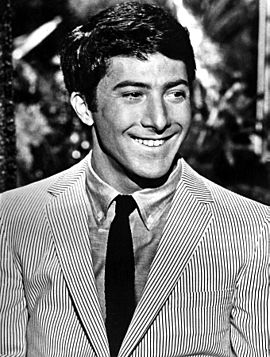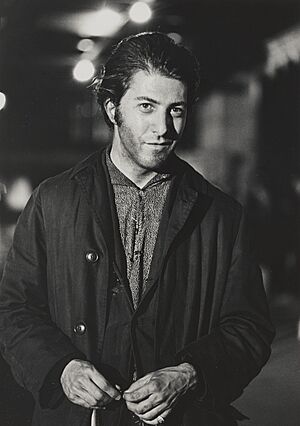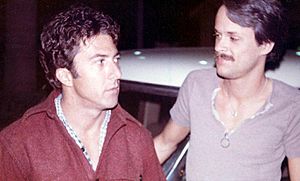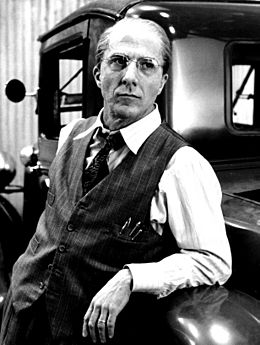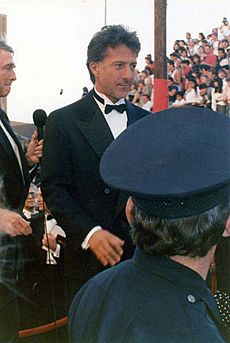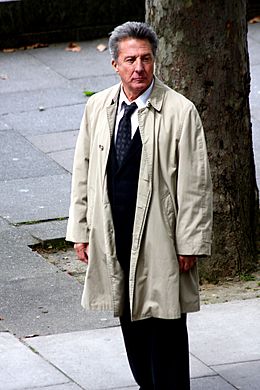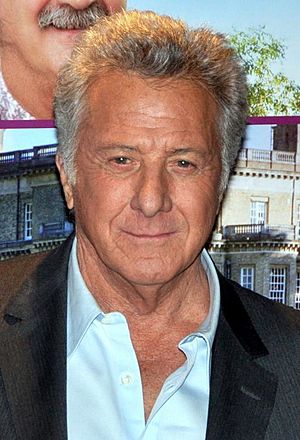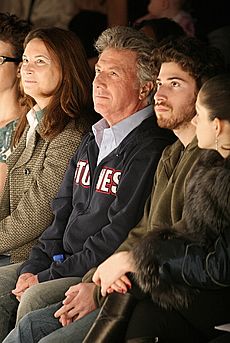Dustin Hoffman facts for kids
Quick facts for kids
Dustin Hoffman
|
|
|---|---|
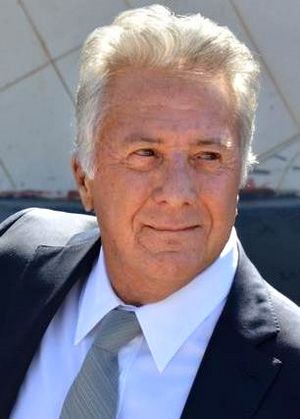
Hoffman at the 2017 Cannes Film Festival
|
|
| Born |
Dustin Lee Hoffman
August 8, 1937 Los Angeles, California, U.S.
|
| Occupation | Actor |
| Years active | 1960–present |
|
Works
|
Full lists |
| Political party | Democratic |
| Spouse(s) |
|
| Children | 6, including Jake |
| Awards | Full list |
Dustin Lee Hoffman (born August 8, 1937) is a famous American actor. He is known for playing many different kinds of characters. Dustin Hoffman has won many awards, including two Academy Awards (also known as Oscars), four BAFTA Awards, and five Golden Globe Awards.
He started his acting journey by studying at the Pasadena Playhouse. His first movie was The Tiger Makes Out in 1967. He won Oscars for his roles in Kramer vs. Kramer (1979), where he played a father going through a divorce, and Rain Man (1988), where he played a character with autism who had special abilities.
Some of his other well-known movies include The Graduate (1967), Midnight Cowboy (1969), Tootsie (1982), and Hook (1991), where he played Captain Hook. In recent years, he has also voiced characters in the Kung Fu Panda movies. In 2012, he directed his first movie, Quartet.
Dustin Hoffman also performed on Broadway. He starred in plays like A Cook for Mr. General in 1961 and Death of a Salesman in 1984. For his role in Death of a Salesman, he won an Emmy Award.
Contents
Early Life and Education
Dustin Lee Hoffman was born on August 8, 1937, in Los Angeles, California. His father, Harry Hoffman, worked in movies before becoming a furniture salesman. Dustin was named after a silent film actor named Dustin Farnum.
His family was Jewish, with roots from Ukraine and Romania. However, he has said that his family did not celebrate Jewish holidays when he was growing up. He realized he was Jewish around age 10.
After graduating from Los Angeles High School in 1955, he first planned to study medicine. But he soon decided to become an actor. He joined the Pasadena Playhouse in 1956. His aunt once told him he wasn't "good-looking enough" to be an actor.
Hoffman also studied piano when he was younger. He hoped to become a classical pianist. However, he felt he wasn't naturally talented in music. He then found his passion for acting. For about 10 years, he worked odd jobs and struggled to find acting roles.
Film Career
Early Roles and Breakthrough
Dustin Hoffman's first acting role was at the Pasadena Playhouse. He acted alongside Gene Hackman, who also became a famous actor. Hoffman, Hackman, and Robert Duvall even lived together in New York City in the 1960s. They were all trying to find acting jobs.
Hoffman studied at the Actors Studio and became a dedicated method actor. This means he deeply explored his characters' feelings and experiences. In 1960, he got a role in an off-Broadway play. His first Broadway show was A Cook for Mr. General in 1961.
He made his film debut in The Tiger Makes Out in 1967. Soon after, director Mike Nichols cast him in the lead role for The Graduate (1967). This was a very important role for Hoffman. He played Benjamin Braddock, a recent college graduate. The movie was a huge success and made Hoffman a major new star. He was nominated for an Academy Award for this role.
After The Graduate, Hoffman chose his next roles carefully. He wanted to show he could play many different characters. He took the lead role in Midnight Cowboy (1969). He played Ratso Rizzo, a sick and struggling man. To prepare, Hoffman even dressed as a homeless person to meet the director. This role earned him his second Oscar nomination. The film won Best Picture.
In 1969, he also starred with Mia Farrow in the romantic drama John and Mary. He won a British Academy Film Award for his performance in this movie.
Becoming a Film Star
In 1970, Hoffman starred in Little Big Man. He played a character who ages from a teenager to a 121-year-old man. Critics praised this film. He continued to appear in major films like Straw Dogs (1971) and Papillon (1973).
In 1974, he starred in Lenny, playing comedian Lenny Bruce. He was nominated for another Best Actor Oscar for this role. Hoffman spent time reading Bruce's autobiography and watching his performances. He felt a strong connection to the character.
All the President's Men (1976) was another important film. Hoffman and Robert Redford played real-life journalists, Carl Bernstein and Bob Woodward. They uncovered the Watergate scandal. This film showed Hoffman playing a character who fought against powerful abuses.
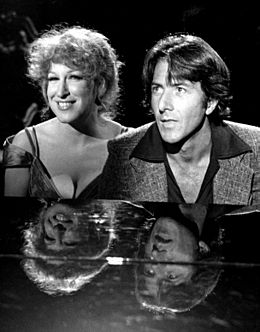
He then starred in Marathon Man (1976) with Laurence Olivier. Hoffman played a student who gets caught up with a former Nazi. He worked hard to get into character, even staying awake for days.
In 1979, Hoffman starred in Kramer vs. Kramer with Meryl Streep. The movie was about a couple's divorce and how it affected their young son. Hoffman won his first Academy Award for this role. The film also won Best Picture. Playing a father in the movie helped Hoffman connect more deeply with his own role as a parent.
Expanding His Career
In Tootsie (1982), Hoffman played a struggling actor who pretends to be a woman to get a role on a TV show. This movie earned him his fifth Oscar nomination. The director, Sydney Pollack, praised Hoffman's ability to show many different emotions.
In 1984, Hoffman returned to Broadway to play Willy Loman in Death of a Salesman. He later played the role again in a TV movie in 1985, winning an Emmy Award. Hoffman had been fascinated by this play since he was 16.
His movie Ishtar (1987), co-starring Warren Beatty, faced many problems during production. It received negative reviews at first. However, over time, it became a cult film, meaning it gained a small but dedicated group of fans.
Next, Hoffman starred in Rain Man (1988) with Tom Cruise. Hoffman played an autistic savant named Raymond Babbitt. To prepare, Hoffman spent two years getting to know people with autism. He learned about their behaviors and experiences.
Rain Man won four Academy Awards, including Best Picture and Best Actor for Hoffman. The director, Barry Levinson, said Hoffman has an "enormous range" as an actor. After Rain Man, Hoffman appeared in Family Business (1989) with Sean Connery.
Established Actor
In the 1990s, Dustin Hoffman appeared in many big movies. He voiced a character in The Simpsons episode "Lisa's Substitute" in 1991. He also played Captain Hook in Steven Spielberg's Hook (1991). His costume for Captain Hook was so heavy that he had to wear a special air-conditioned suit underneath!
Hoffman played a lead role in Outbreak (1995). He played a medical doctor trying to stop a deadly virus from spreading. The movie was praised for its thrilling story. He then appeared in Sleepers (1996) and American Buffalo (1996).
In 1997, Hoffman starred in Wag the Dog, a black comedy film directed by Barry Levinson. He played a Hollywood film producer who creates a fake war to distract from a political scandal. This role earned him his seventh Academy Award nomination.
In 1999, Hoffman received the AFI Life Achievement Award, a very special honor for his career. He continued to act in films like Finding Neverland (2004) and I Heart Huckabees (2004). He also co-starred with Robert De Niro and Ben Stiller in the comedy Meet the Fockers (2004).
In 2008, Hoffman voiced Master Shifu in the animated film Kung Fu Panda. He was praised for his voice work and his character's relationship with the main hero. He won an Annie Award for this role. He also voiced Roscuro in The Tale of Despereaux.
In Last Chance Harvey (2008), Hoffman starred with Emma Thompson. They played two lonely people who find a connection.
Recent Work
Hoffman appeared in Little Fockers (2010), a sequel to Meet the Fockers. In 2011, he returned as Master Shifu in Kung Fu Panda 2. In 2012, he made his debut as a director with the film Quartet. The movie received good reviews.
In 2015, Hoffman starred in Roald Dahl's Esio Trot, a BBC television film based on the classic novel. He won an Emmy Award for his performance. In 2016, he voiced Master Shifu again in Kung Fu Panda 3.
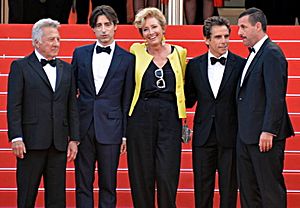
In 2017, Hoffman starred in the Netflix film The Meyerowitz Stories. The film was well-received at the Cannes Film Festival. In 2020, it was announced that Hoffman would return to Broadway in the play Our Town.
He appeared in the film As They Made Us and Sam & Kate in 2022. In October 2022, Hoffman was cast in Francis Ford Coppola's film Megalopolis, which premiered in 2024. He also reprised his role as Master Shifu in Kung Fu Panda 4 in 2024.
Awards and Honors
In 1999, the American Film Institute honored Dustin Hoffman with their AFI Life Achievement Award. This award celebrates actors who have made a great impact on film. Many famous actors praised his work at the ceremony.
In 2012, Dustin Hoffman received the Kennedy Center Honors. This award recognizes artists for their lifetime contributions to American culture. The committee praised his "unyielding commitment to the wide variety of roles he plays."
Personal Life
Family Life
Dustin Hoffman married Anne Byrne in 1969. He adopted her daughter, Karina, and they had a daughter named Jenna. They divorced in 1980.
Later in 1980, he married Lisa Gottsegen. They have four children together: Jacob, Rebecca, Maxwell, and Alexandra. Dustin Hoffman also has several grandchildren. He has mentioned that his children from his second marriage had bar or bat mitzvah ceremonies.
Health
Dustin Hoffman received successful treatment for cancer in 2013.
Images for kids
See also
 In Spanish: Dustin Hoffman para niños
In Spanish: Dustin Hoffman para niños
 | Bayard Rustin |
 | Jeannette Carter |
 | Jeremiah A. Brown |


